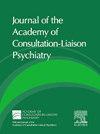The Development of a Pediatric Catatonia Clinical Roadmap for Clinical Care at Vanderbilt University Medical Center
IF 2.5
4区 心理学
Q2 PSYCHIATRY
Journal of the Academy of Consultation-Liaison Psychiatry
Pub Date : 2024-11-01
DOI:10.1016/j.jaclp.2024.08.003
引用次数: 0
Abstract
Background
Pediatric catatonia is associated with a high degree of morbidity and mortality in children. However, pediatric catatonia is highly responsive to treatment if rapidly identified and appropriate interventions are administered. To our knowledge, there are no current publications which propose a systematic approach for the management of pediatric catatonia.
Objective
The aim of our report was to create multidisciplinary clinical care roadmap for catatonia in the inpatient pediatric setting within Vanderbilt University Medical Center (VUMC).
Methods
At VUMC, we formed a team of pediatric providers from child and adolescent psychiatry, rheumatology, neurology, pediatric hospital medicine, and pediatric psychology. Our team met on a regular basis over the course of 2022-2024 to review the current literature on pediatric catatonia and develop a consensus for clinical assessment and management.
Results
We determined consensus recommendations from our VUMC multidisciplinary team for the following domains of pediatric catatonia inpatient clinical care: initial assessment of pediatric catatonia in the inpatient pediatric settings, medical and psychiatric work up for pediatric catatonia, the lorazepam challenge in pediatric populations, behavioral and environmental considerations, and the use of electroconvulsive therapy and alternative psychopharmacologic interventions in pediatric catatonia.
Conclusion
Pediatric catatonia is a condition associated with a high degree of morbidity and mortality but is responsive to treatment if diagnosed and treated early. The inpatient pediatric medical setting provides a unique opportunity for identification and treatment. Our clinical care roadmap provides tools for inpatient clinicians at VUMC to identify pediatric catatonia and initiate an evidence-based approach to medical workup, management, and clinical care. This approach has the potential to significantly improve longitudinal outcomes and quality of life improvements for children at VUMC with catatonia and their families.
为范德比尔特大学医学中心的临床护理制定儿科卡他性精神障碍临床路线图。
导言:小儿紧张症与儿童的高发病率和高死亡率有关。然而,如果能迅速识别并采取适当的干预措施,小儿紧张症对治疗的反应非常快。据我们所知,目前还没有任何出版物提出治疗小儿紧张症的系统方法。我们的报告旨在为范德比尔特大学医学中心(VUMC)儿科住院病人的紧张症制定多学科临床护理路线图:在范德比尔特大学医学中心,我们组建了一个由来自儿童与青少年精神病学、风湿病学、神经病学、儿科医院医学和儿科心理学的儿科医疗人员组成的团队。我们的团队在 2022 年至 2024 年期间定期举行会议,回顾当前有关小儿紧张症的文献,并就临床评估和管理达成共识:我们确定了弗吉尼亚大学医学院多学科团队就儿科紧张症住院患者临床护理的以下领域提出的共识建议:儿科紧张症住院患者的初步评估、儿科紧张症的医学和精神病学检查、劳拉西泮在儿科人群中的挑战、行为和环境因素、电惊厥治疗和其他精神药物干预在儿科紧张症中的应用:结论:小儿紧张症是一种发病率和死亡率都很高的疾病,但如果及早诊断和治疗,其治疗效果还是不错的。儿科住院医疗环境为识别和治疗提供了独特的机会。我们的临床护理路线图为 VUMC 的住院临床医生提供了识别儿科紧张症的工具,并启动了循证医学检查、管理和临床护理方法。这种方法有可能显著改善VUMC患有紧张症的儿童及其家人的纵向治疗效果和生活质量。
本文章由计算机程序翻译,如有差异,请以英文原文为准。
求助全文
约1分钟内获得全文
求助全文
来源期刊

Journal of the Academy of Consultation-Liaison Psychiatry
Psychology-Clinical Psychology
CiteScore
5.80
自引率
13.00%
发文量
378
审稿时长
50 days
 求助内容:
求助内容: 应助结果提醒方式:
应助结果提醒方式:


